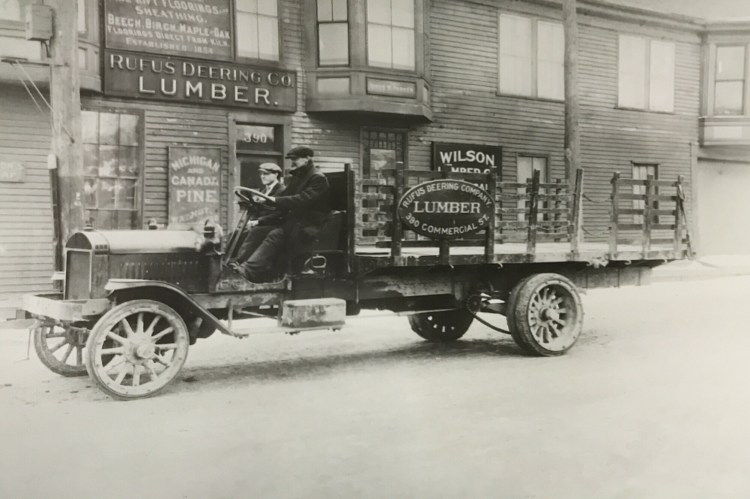After 162 years in business, Rufus Deering Lumber Co. of Portland plans to close its Commercial Street lumberyard.
Senior Vice President Dan Labrie said the property, which has become extremely valuable, has been placed under contract with an interested buyer. Labrie would not disclose the purchaser’s name or the property’s intended future use, but city spokeswoman Jessica Grondin said the buyer is Reger Dasco Properties, a partnership of developers based in Massachusetts and New York that has built high-end condominium projects in Portland and elsewhere.
A call to Reger Dasco for comment was not returned Monday night.
“We knew someday that the land would be sold, and we’re happy about that,” Labrie said, noting that Rufus Deering has continued to generate a healthy profit over the years.
Labrie said the company will cease operating Nov. 30 and begin the process of transferring most of its staff and assets to competitor Eldredge Lumber & Hardware in Portland and York. Roughly three-fourths of Rufus Deering’s 26 employees will be hired by Eldredge, he said.
According to Portland Assessor’s Office records, the 2.5-acre lumberyard property is valued at more than $2.3 million for tax purposes.
Dan Remick, Eldredge’s general manager, said the Moody family, which owns Rufus Deering, had decided to sell the property to a developer, and that Eldredge agreed to buy their business assets and integrate them into the company’s Presumpscot Street lumberyard. He said the transaction will bring the majority of Rufus Deering’s sales and support staff, yard help and drivers “over to the Eldredge team.”

Seth Miller moves lumber Monday in the yard at Rufus Deering Lumber Co. on Commercial Street in Portland. The company will close after 162 years in business. Miller has worked at Rufus Deering since the end of June. Brianna Soukup/Staff Photographer
“We will also be purchasing their trucks and equipment to help us better serve their customers,” Remick said.
Rita Ferris, president of the Northeastern Retail Lumber Association, said the current business environment for independently owned lumberyards is challenging, with heavy competition from big-box stores such as Home Depot, as well as from each other. As a result, independents have been buying up their smaller competitors and consolidating.
“It’s just tough out there in the industry,” she said. Her organization represents about 1,100 such businesses, including four in Portland.
But Ferris said Rufus Deering decided to sell because the property on which the business sits has become such prime real estate that it is essentially too valuable not to sell.
“They’re sort of like the little house that the big city grew up around,” she said. “It was really a matter of when the right opportunity came along.”
The area surrounding Rufus Deering has been targeted for redevelopment in recent years, including the construction of a five-story residential building at the site of the former El Rayo Taqueria restaurant, and the 131-room Courtyard by Marriott hotel across from the Portland Fish Pier.

According to Portland Assessor’s Office records, the 2.5-acre Rufus Deering lumberyard property, seen in June, is valued at more than $2.3 million for tax purposes. The company will cease operating Nov. 30 and begin transferring the bulk of its staff and assets to competitor Eldredge Lumber & Hardware in Portland and York. Derek Davis/Staff Photographer
One of the city’s oldest businesses, Rufus Deering Lumber is among a small number of local companies – H.M. Payson, Schlotterbeck & Foss and J.B. Brown & Sons are others – founded in the early to mid-1800s that are still operating today.
It was founded as a lumber finishing, refinishing and marketing business in 1854 by Rufus Deering, of Portland, according to news stories from the Portland Press Herald archive. For the first 90 years or so, it was on the Portland waterfront at Hobson’s Wharf, directly across the street from its current location.
It was an ideal spot for a lumber dealer in what was a hub for trade during the mid-19th century. The location allowed Rufus Deering Lumber to ship Maine-harvested wood products around the country and abroad via sailing ships. Lumber harvested from southern Maine forests was brought to Rufus Deering by teams of horses and oxen.
After the Great Fire of 1866, which consumed 1,500 city buildings after a spark from a child’s Fourth of July firecracker ignited a pile of wood shavings, Deering took on two partners to help meet the demand for lumber to rebuild Portland. More than 10,000 people were rendered homeless by the fire.

A framed receipt from Aug. 2, 1883, hangs in the office at Rufus Deering Lumber Co. on Commercial Street. The company, which was started in 1854, will be closing after 162 years in business. Brianna Soukup/Staff Photographer
The business was owned and operated by one of the three partners until the early 1900s, when it was sold to James Parker. The sale roughly coincided with more modern ways of delivering lumber, including by streetcar, rail and truck.
The business changed hands twice more before being acquired in 1955 by William Moody. Four members of the Moody family were listed as lessors of the property in 2015 in the Cumberland County Registry of Deeds.
Remick, of Eldredge Lumber, said he emailed his employees letting them know about the acquisition of Rufus Deering’s assets and staff. As part of the deal, Eldredge also is acquiring a kitchen and millwork showroom at another location on Commercial Street.
“We will assume operations of the showroom at its current location, allowing us to continue servicing their existing customers as well as offer our customers more products and services in the Portland area,” Remick said in his email.
Staff Writer Matt Byrne contributed to this report.
Send questions/comments to the editors.



